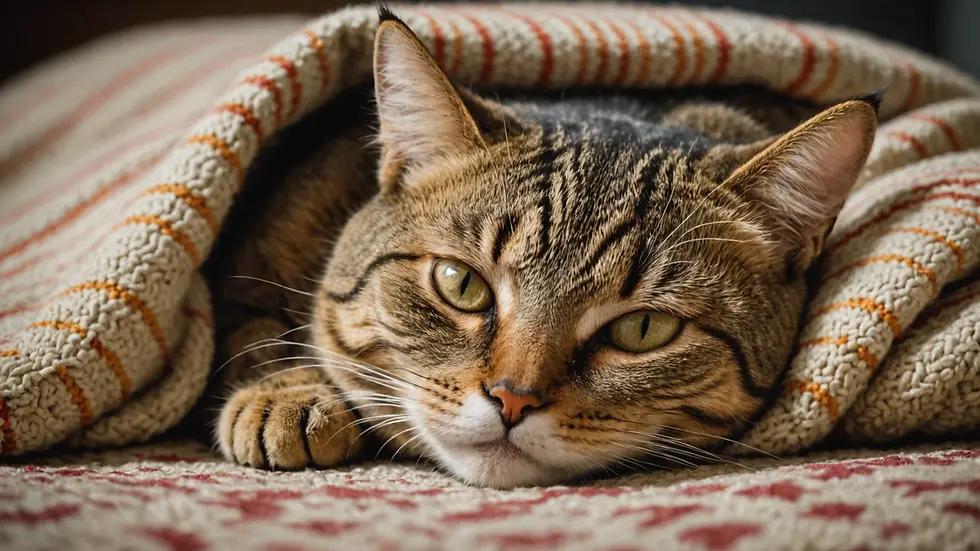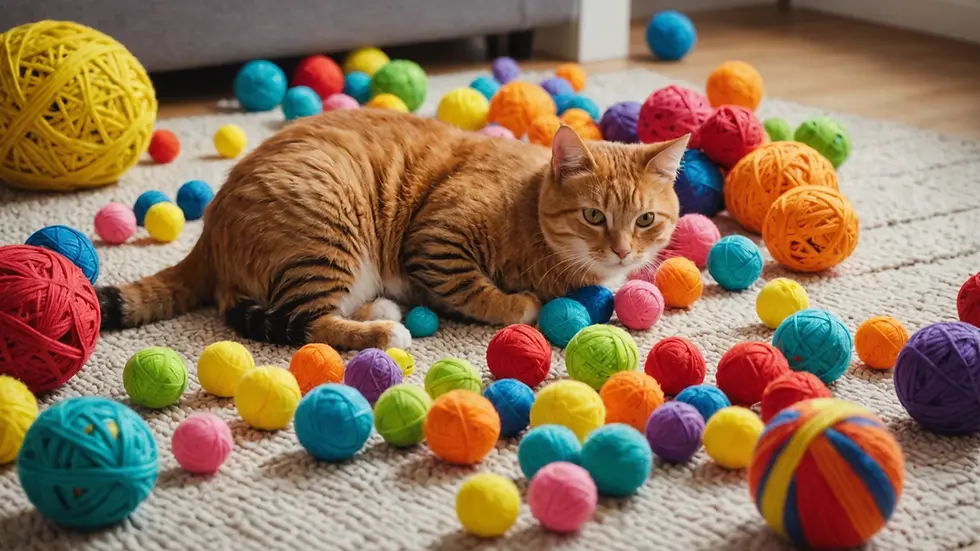The Surprising Ways Cats Impact Mental Health: A Closer Look at Stress and Anxiety Reduction
- Jyotiraj Borah
- Feb 5
- 4 min read
Cats have captivated our hearts for thousands of years with their charm and playful antics. Beyond their adorable quirks, many cat owners discover that their furry companions play an essential role in managing stress and anxiety. This post explores the significant mental health benefits cats provide, revealing how these creatures help us navigate everyday challenges.
The Bond Between Humans and Cats
The relationship between humans and cats is special. Unlike dogs that often seek constant interaction, cats enjoy their independence. This unique bond allows cat owners to appreciate their pet's company without feeling overwhelmed.
Research indicates that owning a cat can reduce anxiety significantly. For instance, a study revealed that 74% of pet owners reported improvements in their overall mood after adopting a cat. Caring for a living being fosters a sense of purpose. The calming presence of a cat can soothe an anxious mind significantly, whether you're dealing with a stressful day at work or personal challenges.
Petting a cat also releases oxytocin in both the cat and the owner, creating feelings of connection. This bond enhances emotional well-being and promotes tranquility in the household.

The Science of Purring
Among the many delightful features of cats is their purring. While we often associate purring with contentment, it may also have healing benefits.
Cats produce a purr at frequencies ranging from 25 to 150 Hertz. Research shows that these frequencies can help lower stress, decrease blood pressure by as much as 10%, and even promote recovery from injuries.
When a cat curls up beside you and begins to purr, it isn't just showing affection. This soothing sound can serve as a natural remedy for anxiety, creating a peaceful ambiance that many find comforting.
Lowering Cortisol Levels
Cortisol, known as the "stress hormone," is released during moments of stress. Studies indicate interactions with pets can significantly lower cortisol levels. For example, a 2014 study found that just 15 minutes of petting a cat could lower cortisol levels by over 30%.
Spending time with a cat can shift focus away from stressors, aiding relaxation. Whether engaging in play, petting, or simply observing your cat, these interactions offer a mindful distraction.
Creating a routine that involves time with your cat could yield immense mental health benefits. Simple tasks like grooming a cat promote calmness and help lower stress levels.

Cats as Companions in Recovery
For those facing mental health challenges, cats often serve as invaluable support. Their non-judgmental nature makes them excellent listeners.
Many individuals find solace in sharing worries with their feline friends. This unburdening can ease anxiety, allowing for emotional expression in a safe space.
Moreover, cats require less maintenance than other pets, making them an excellent option for individuals who may struggle with responsibilities due to mental health issues. Their independent personalities contribute to providing companionship without overwhelming their owners, fostering a sense of balance that is crucial for mental well-being.
The Joy of Play
Playtime is essential not only for cats but also for their owners. Engaging in interactive play helps keep cats active and provides an enjoyable break from daily stressors.
Whether using string toys, laser pointers, or feather wands, playing with your cat can create joyful moments. This shared fun not only promotes exercise for both you and your pet but also brings laughter, which is vital for combating stress.
Incorporating regular play into your routine serves as an effective way to elevate your mood and reduce anxiety.

Building Routines and Encouraging Mindfulness
Cats thrive on routines, and adopting a similar approach can greatly benefit their owners. Establishing a regular schedule that includes feeding, playtime, and cuddles can bring stability to both your life and your cat’s.
This structure encourages mindfulness, promoting daily balance. The predictability of caring for a cat can help soothe an anxious mind and keep you grounded.
Cats themselves exemplify mindfulness. Observing their engagement with the world—whether sunbathing, stalking a toy, or lounging—can teach valuable lessons about living in the moment. This awareness can help owners appreciate life’s little joys.
The Comfort of Presence
Simply being near a cat provides incredible comfort. Studies have found that pets can significantly lower feelings of loneliness and boost a sense of belonging.
For those living alone or feeling isolated due to anxiety or depression, a cat offers companionship that can alleviate loneliness. Their soft presence serves as a gentle reminder that one is never truly alone, even during tough times.
In essence, the comforting presence of a cat fills a void often deepened by anxiety, offering solace and emotional support.
Contributing to a Calmer Home Environment
A cat can transform your home into a tranquil sanctuary. Their calming behaviors, like curling up in a sunny spot or stretching leisurely, encourage owners to create a serene atmosphere.
Many cat owners report that having a cat around reduces tension at home. The playful antics of a cat can lighten the mood, making it easier for everyone to relax.
Moreover, the quiet companionship cats provide can create a peaceful space, ideal for unwinding after a stressful day.
Fostering Connections
Cats can act as social catalysts, encouraging connections among people. Cat lovers often find common ground with fellow pet owners, leading to friendships and new social opportunities.
Sharing experiences—like discussing cat quirks, exchanging pet care tips, or attending cat-related gatherings—can help fight feelings of isolation.
Building connections with others who share a love for cats can provide essential support to ease anxiety and stress.
Closing Thoughts
Cats offer much more than companionship. Their unique traits, soothing purring, and playful spirits make them incredible allies in enhancing mental health.
As we explore the profound ways pets influence our lives, it becomes increasingly apparent that cats hold a special place in emotional well-being. The bond formed with these affectionate companions can be a powerful tool for reducing stress and anxiety.
Whether you're a longtime cat owner or considering welcoming a feline friend into your life, acknowledging the role of cats in mental health promotes deeper appreciation and connection with these remarkable animals. By integrating daily cat interactions into your life, you establish a cherished source of joy, calm, and companionship, contributing to a healthier mental state.
Ultimately, the unexpected ways cats impact mental health remind us of the healing strength found in relationships—and there’s no better companion than a purring, cuddly cat by your side.




Comments